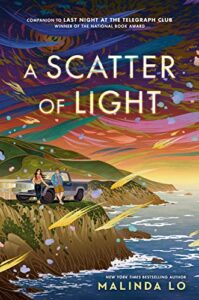Amazon Affiliate Link | Bookshop.org Affiliate Link
I was ecstatic when I heard that Malinda Lo was writing a loosely connected follow up to Last Night at the Telegraph Cub because Last Night at the Telegraph Club is a hugely important lesbian coming of age novel set in 1950s San Francisco Chinatown that A) I wish I had had access to as a teenager and B) I’m so happy the youths have access to today. In A Scatter of Light, Lo attempts to recreate that same sense of teenage discovery and feelings in a more recent decade and succeeds wildly. I listened to the audiobook and had a fantastic experience. I cannot recommend this book highly enough. Lo is unparalleled at invoking the teenage experience, where your feelings are huge and undefined and you don’t yet have the life experience to have perspective.
In A Scatter of Light, when recently graduated Aria West arrives at her eccentric artist grandmother Joan’s house in California for the summer, she’s upset that she’s not spending the summer on Martha’s Vineyard with her friends as planned and doesn’t expect the summer to come to much. But Joan, rather than judging her for the high school scandal that landed Aria in California, encourages her to pursue her interests, interrogate her own perspectives, and look at things in new ways, leading Aria to both connect with her past and push her boundaries with art while she’s there. Aria’s summer is further derailed by Joan’s gardener Steph, an aspiring musician, who invites Aria into a community of working class lesbians and queer events that Aria had previously never thought about. What started out as just killing time until she could leave for college turns into a life-changing summer as Aria learns several new things about herself. Dyke marches, art history, music festivals – Lo balances the nostalgia-drenched coming of age experience with real emotion for a surprisingly solid teenage narrative.
What I loved best about this book is that Aria’s beautiful emotional queer journey happens with all the grace of getting tackled by a football player and all the emotional subtlety of a fireworks show. It’s perfect and wonderful and great fun to read because Aria feels and loves with all the explosive power of a teenager who doesn’t have the experience to put her emotions into context. And many times her narration had me screaming with glee and with the experience of an adult perspective. It was an absolute blast to watch Aria have her hot lesbian summer, I had the most fun time listening to the audiobook.
Alas for Aria, not everything is as simple as getting flirted with by several lesbians and slowly realizing her feelings are not just friendship. For one thing her grandmother Joan, her ostensible reason for being in California to begin with, encourages her to explore art, something that Aria had never considered but starts mixing with her passion for astronomy and her history with her deceased grandfather. Her mother delivers some family news that sends Aria into a minor tailspin. (spoilers) And Steph, the object of Aria’s newly awakened queer desire, comes with an established relationship, albeit one that is making both halves of it miserable. It all comes to a head when Joan’s physical condition abruptly worsens, bringing Aria’s summer of awakening to an emotional close. (end spoilers)
A Scatter of Light is a dramatic, and fun ode to early 2000’s queer culture, coming of age, and teenage feelings, and I am so, so glad that youths today can just pick it off of any shelf. The characters feel deeply, the decisions are messy, and the open mic nights are queer. And journeying along with Aria while she had a wild summer awakening was the highlight of my fall. I appreciated the masterful way Lo handled themes of growing up and reaching new emotional maturity and dealing with life’s complicated circumstances. I especially appreciated that the summer remained what it says in the title – a scatter of light, a transient experience, a bubble of time that changed everyone involved but was not a lifetime commitment at 18. This book was amazing to read as an adult, would have absolutely given me new thoughts and perspective if I had had it available as a teen, and would be a great addition to your to-read list.


